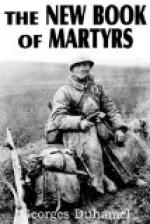Lapointe sits down to have his dressing cut away, then he makes a half turn towards Ropiteau.
“You see—getting on famously.”
Ropiteau admires unreservedly.
“Yes, you’re right. It looks first-rate.”
“And you know ... such a beastly mess came out of it.”
At this moment, the busy forceps cover up the wounds with the dressing, and the operation comes to an end.
“So long!” says Lapointe to his elbow, casting a farewell glance at it. And he adds, as he gets to the door:
“Now there are only the damned fingers that won’t get on. But I don’t care. I’ve made up my mind to be a postman.”
XVII
Bouchenton was not very communicative. We knew nothing of his past history. As to his future plans, he revealed them by one day presenting to the head doctor for his signature a paper asking leave to open a Moorish cafe at Medea after his recovery, a request the head doctor felt himself unable to endorse.
Bouchenton had undergone a long martyrdom in order to preserve an arm from which the bone had been partially removed, but from which a certain amount of work might still be expected. He screamed like the others, and his cry was “Mohabdi! Mohabdi!” When the forceps came near, he cried: “Don’t put them in!” And after this he maintained a silence made up of dignity and indolence. During the day he was to be seen wandering about the wards, holding up his ghostly muffled arm with his sound hand. In the evening, he learned to play draughts, because it is a serious, silent game, and requires consideration.
Now one day when Bouchenton, seated on a chair, was waiting for his wound to be dressed, the poor adjutant Figuet began to complain in a voice that was no more than the shadow of a voice, just as his body was no more than the shadow of a body.
Figuet was crawling at the time up the slopes of a Calvary where he was soon to fall once more, never to rise again.
The most stupendous courage and endurance foundered then in a despair for which there seemed henceforth to be no possible alleviation.
Figuet, I say, began to complain, and every one in the ward feigned to be engrossed in his occupation, and to hear nothing, because when such a man began to groan, the rest felt that the end of all things had come.
Bouchenton turned his head, looked at the adjutant, seized his flabby arm carefully with his right hand, and set out. Walking with little short steps he came to the table where the suffering man lay.
Stretching out his neck, his great bowed body straining in an effort of attention, he looked at the wounds, the pus, the soiled bandages, the worn, thin face, and his own wooden visage laboured under the stress of all kinds of feelings.
Then Bouchenton did a very simple thing; he relaxed his hold on his own boneless arm, held out his right hand to Figuet, seized his transparent fingers and held them tightly clasped.




